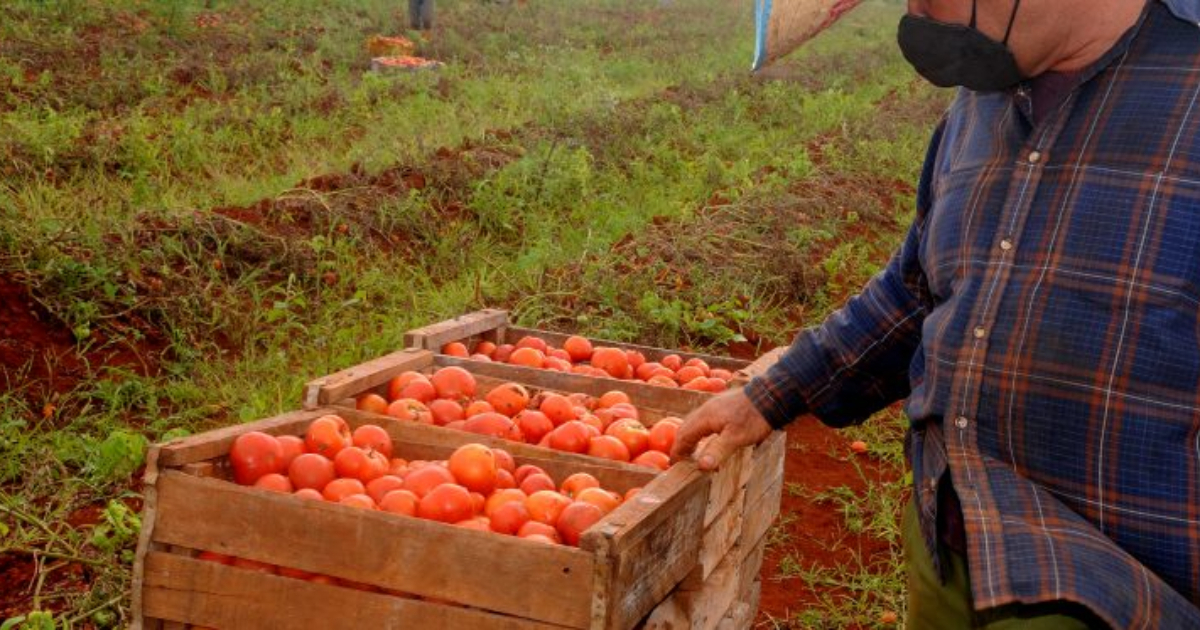
More than 200 quintals of tomatoes rotted in Artemisa, as a result of the delay in their collection by the province's Collection Company, which since last December has not delivered collection boxes to the farmers of the Camilo Cienfuegos Strengthened Credit and Services Cooperative (CCSF).
The usufructuaryHumberto Martínez Lara said tonewspaperThe Artemiseño that this situation is repetitive on the Santa Teresa farm and the vegetable is already too ripe, so its only destination may be a processing industry, which would imply losing half of its profits.
Martínez Lara, who belongs to the aforementioned CCSF, also pointed out thatThe rains in September of the previous year caused him to lose a good part of his harvest, but after replanting in October he achieved good yields., hence the lack of support from state companies linked to agricultural production is even more regrettable.
According to the local newspaper, he achieved it “without fertilizers, herbicides or other products, protected by biological means as thebeauveria (foliar application that works as a biological insecticide or biopesticide) and efficient microorganisms”.
This farmer has been working the land for more than 20 years and is among the largest vegetable producers in the territory of western Cuba, due to his tradition of guaranteeing seedbeds. Martínez Lara assures that he also has onion and eggplant, “and I plant various crops on 13.4 hectares.”
Part of its production is destined for the Artemisa State Agricultural Market, where it is transformed into tomato sauce and "Vita Nuova", which that entity then sells for 40 pesos per liter. “30 less than the pomos they sell in the cold store, and cheaper if I compare it with the price of güireña sauce, from the mini-industry of the same name: 82 pesos per liter,” said Félix Hernández Valdés, a regular customer of the establishment.
Suhan Vega Breijo, market administrator, said that they seek to “reduce the loss due to the loss of small and ripe tomatoes; However, despite their efforts to add commercial value to guava, cassava and other foods close to decomposition, they do not have the technical sheet that authorizes their sale and they barely have an industrial blender to process all these products.
Also in the province of Artemisa, theBasic Business Unit (UEB) Villa Roja should cover the population demand for this type of food.
This entity is part of a project by the Agroforestal Group, which provides for a complete processing line: two vacuum bins of 500 liters each, a pulper, a crusher, a can sealer, fruit washing machines with agitation, a selection mat and a small line. to package mini-doses, as technologist Pedro López explained to the newspaper.
Its operation depends on the arrival of a donation from the European Union and financed by theUnited Nations Development Program (UNDP).
However, in that industry there is a production line that could have processed the tomato in the middle of the campaign. However, the factory's main boiler was dismantled in December for poorly planned maintenance at the peak of the tomato harvest, after several years without repair action.
According to López, the team had blockages and leaks, which had to be repaired before the start of the campaign, but since there is still no solution,More than 200 boxes of vegetables arrived at the facility in vain.
In the middle of the deepfood crisis facing CubaIn other territories of the country, crops were also lost due to lack of resources during 2021. In May, at Finca el Palmar, in Manzanillo, Granma,The loss of a mango crop was reported due to State inefficiency.
Several Internet users then commented on the sad reality on social networks and regretted that this happens so many times, because sweets, juices and preserves could have been made with that fruit.
In April, beekeeper Yoandy Verea, resident in the town of Perico, in Matanzas,reported that it could not complete the collection of tons of honey due to the shortage of fuel, essential for work in the hives. The farmer, represented by the Ramón Rodríguez Milián Credit and Services Cooperative (CCS), questioned the bureaucracy that caused him to lose his production and that of other beekeepers in the area.
"We have been without fuel for several months and the hives in the field are full of honey. What agricultural institution in this country is interested in losing such production," he commented.
In March, several Cuban farmersThey reported the loss of their short cycle crops, because the state company Acopio, in charge of collecting and transporting them to the markets, does not do so nor does it allow producers to transport and market them by its means.
In a report published byMartí NewsEsteban Ajete Abascal, leader of the League of Independent Peasants of Cuba, said that these producers had “a group of products such as tomatoes, onions, cabbage and other vegetables, which are practically being lost in the countryside because the State does not transport them.” .
What do you think?
SEE COMMENTS (14)Filed in: